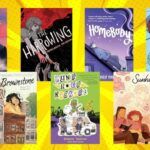
Romance Writers of America Awards Book with Genocidal “Hero”
Content warning: This post discusses racism and genocide against Indigenous peoples
As with many controversies in the book world, I first heard about this in a subtweet I didn’t understand. After a minute of scrolling, the issue had become clear: On Saturday evening, the Romance Writers of America (RWA) announced that Karen Witemeyer’s At Love’s Command won the VIVIAN award for “Romance with Religious or Spiritual Elements.” In the prologue, which you can read in the Amazon preview, the book’s romantic “hero” is a Captain participating in the Wounded Knee Massacre after thirteen years of “Indian fighting.” Wounded Knee was a massacre of nearly 300 mostly unarmed Lakota people — including women, children, and elderly — in 1890.
In this prologue, Matt mentions that he was motivated to go into this line of work after “he found his parents and baby sister murdered by a Comanche war party,” which begins to set up a thread of comments implying that what happens is justified by the Indigenous people’s actions. He liked it better when they were “docile.” He refers to the other soldiers participating in the violent displacement of native people who had lived on the land for thousands of years as “good men.” (He also calls women the “weaker sex,” but this post isn’t about that.)
Matt is concerned that the “medicine man chanting” is stirring up defiance, taunting his men, and inciting the Lakota “warriors.” He then asks another soldier for a bible verse to ground him, contrasting his own religion with the native religious practices, calling the latter “exactly what they didn’t need.” Here, I’ll point to a long-time criticism of the existence of the “Romance with Religious or Spiritual Elements” category: that no other religion or spiritual practice besides Christianity has had a hope of winning.
Once the shooting begins, he says that he can’t “allow the women and children to escape, but he could take them into custody.” When he tries to get one of the older women to follow him out of the melee, she is portrayed as “casting blame on him and his kind” and he says “she’d rather die with her people than follow a white man to safety,” implying that she didn’t trust him solely because he was white, not because people wearing the same uniform as him were literally shooting cannons at her family.
At the end of the prologue, Matt is upset by what happened, calling it a massacre, but also saying “this was supposed to be a simple weapon confiscation. An escort to the reservation.” There’s no acknowledgement that this, the displacement of the Indigenous people at gunpoint and removal of their agency, is also reprehensible.
And this is our award-winning romance hero. After the prologue, he does leave the Army to work with a group of mercenaries who “defend the innocent.” He may have done some self-reflection and is attempting to atone for his sins, but the fact of the matter is this novel is painting a soldier who participated in 13 years of “Indian hunting,” a genocidal massacre, and the forcible removal of an entire population from their ancestral homelands as a romantic figure.
Many of the people commenting online equated this story to Nazi romances, one of which also recently finalled in the RWA’s RITA award. It’s also worth pointing out that multiple people raised the issues with this book when it was announced as a finalist in April. To add insult to injury, this book won an award named after a Black woman as a symbol to the organization’s commitment to fixing the award’s issues with race. This award coming so soon after hundreds of unmarked graves of Indigenous children were discovered at compulsory boarding schools run by religious authorities twists the knife even further.
This is far from the first misstep from RWA. In December of 2019, there was a major controversy where Chinese-American romance author and former Romance Writers of America (RWA) Board Member and Ethics Committee Chair Courtney Milan was sanctioned by RWA for publicly calling out racist depictions in a book. For years before then, their annual awards the RITAs were criticized for lacking diverse finalists, among other issues. There was also the time RWA tried to define romance as “between one man and one woman.”
In May of 2020 RWA announced that they were retiring the RITAs, revamping their awards, and launching the Vivian awards, named after RWA founder Vivian Stephens. RWA created new judging guidelines and new scoring guidelines. I spoke to two judges who participated in Round 1 and Round 2 of judging; they said there was no place for comments in judging, though in a training session, the team asked judges to email them if triggers or warnings arose in a text. There weren’t any steps given for what judges should do if they encountered a book that should not be considered for an award, based on its harmful content. They also pointed out all judges were required to watch a 45 minute video addressing diversity, implicit bias, and cultural competence. They were disgusted by this book’s win and neither judged for this category, but they did say the new process felt like an improvement over the previous process. However, with just one non-white winner finalling,* many are left wondering if these improvements had any effect.
After the big shakeup at the end of 2019, a new diverse Board of Directors was elected with promises to turn things around. I personally know or know of several of these people, and they really are great people with the very best of intentions. They gave me and many others hope for the future of RWA, but a lot of members and former members are seeing this award as a sign of the same old issues persisting. There are still plenty of members of the organization who do not wish for change and even some who actively undermine any attempts at moving forward. How much can these directors do with such a large contingent of their own organization fighting against diversity and inclusion efforts?
The Vivian Awards were meant to be a new start for RWA, but awarding the romance genre’s highest award to a book that romanticizes a tragedy the US Congress apologized for in 1990 seems like more of the same old stuff.
Update: RWA has since released a statement addressing the awards.
Editor’s note: A second RWA judge’s comments have been added to this article since it was originally posted.
This article originally indicated that no LGBTQIA+ stories were finalists for the award to the best of the writer’s knowledge; in fact finalists Roughing by Michaela Grey and There Galapagos My Heart by Philip William Stover are both LGBTQIA+ romances.













